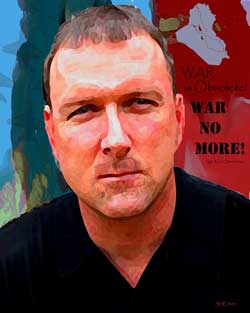There’s little doubt that Fort Lewis Army officer Ehren Watada, if he continues to refuse deployment to Iraq, is headed for an Army stockade. At a Wednesday, June 7, press conference, Watada, a first lieutenant with the Stryker Brigade, said he believes the war is morally wrong but has chosen not to seek conscientious-objector status. He joined the Army a few months after the U.S. invaded Iraq, but now he contends the war is illegal, based on the Bush government’s “deception . . . manipulation [and] misconduct,” which emerged later. That makes the order to send him to fight the war illegal, too, he argues. It’s a contention, however, he’ll unlikely be able to prove to a military court.
Watada, 28, first will have to demonstrate that the war, sanctioned by Congress and U.S. coalition partners, violates federal or military law. Should he somehow surmount that legal mountain, he must separately prove his deployment this month is itself illegal. He likely knows his fate—this is more protest than legal challenge—and he’s drawn the admiration of the antiwar movement, along with the wrath of some military families. He also might be quietly cheered on by some fellow soldiers but despised by others who, on the ground in Iraq, see it not as a war of good or bad or lawfulness but of survival, one where their main mission is to watch each other’s back. Watada believes, however, “I best serve my soldiers by speaking out.”
The similar case of Sgt. Kevin Benderman may be a good indicator of Watada’s future. Though it’s not widely known, Benderman, of the 4th Infantry Division out of Fort Hood, Texas, is already in the Fort Lewis stockade for refusing to deploy to Iraq. A 10-year Army veteran, Benderman actually did a tour there, from the time of the March invasion through September in 2003. After shipping home, he changed his views, remembering such incidents as, he claimed, a commander ordering his unit to shoot Iraqi children if they tossed pebbles again at U.S. soldiers. Facing redeployment to Iraq in 2004, he filed for conscientious-objector status. Unlike Watada, who is taking a legal stand, Benderman sought exception on moral grounds. But Army command refused even to accept his filing, Benderman contends. He was convicted last year of “missing movement”—refusing deployment—and was given 15 months in prison, loss of pay, reduction in rank, and, when he’s released perhaps late this year, a dishonorable discharge. He is appealing.
Benderman, 41, frequently writes letters from the stockade that are published on the Web (www.bendermantimeline.com). He originally referred to himself as a conscientious objector and later added “prisoner of conscience.” In one of his first messages, he wrote, “I have laid down my weapons of war to pick them up never again. It is my sincere hope that more people will do the same so that our children and grandchildren will never have to experience what so many of us already have—the single most barbaric of human endeavors, otherwise known as war.” More recently, he expanded on his moral views: “We cannot expect government to do what is necessary to eliminate war because it generates large amounts of revenue for government. Governments and businesses are able to make record profits from war while the average citizen fighting in any given war cannot get proper treatment for their wounds or the mental and emotional anguish suffered as a result of their participation in war. How is this honorable?”
Like Benderman, Watada is ready to follow his conscience and is “prepared to face the punishment.” He almost certainly will be punished, and he could end up in a cell near Benderman. Watada’s already being called some of the same names Benderman has heard, and Benderman has this advice for those who follow: “People told me that I abandoned soldiers. I did not. I chose to no longer fight in wars, because wars will never save lives, and they will never bring peace. I stand for soldiers that their lives and service be given the respect they deserve. People told me that I was a coward. They can believe that, but I know what it takes to stand on my principles against the tide, with the only certainty being that my wife stood with me. People told me that I was letting my country down. I disagree. I am standing to defend what our constitution was founded on—moral principles. . . . This country has compromised its integrity and lost its moral courage. We can’t help others until we have fixed ourselves.”








